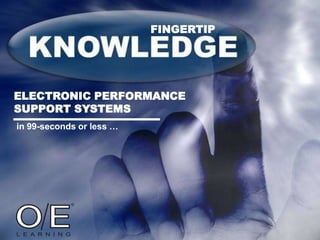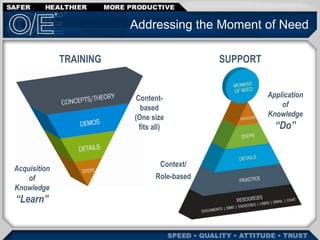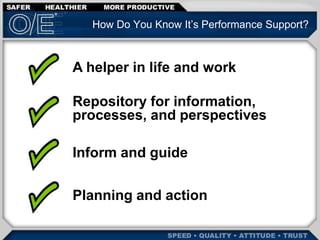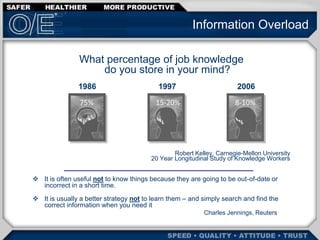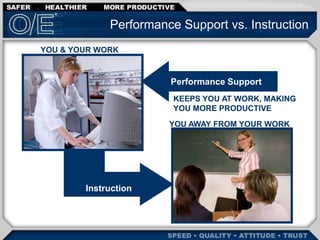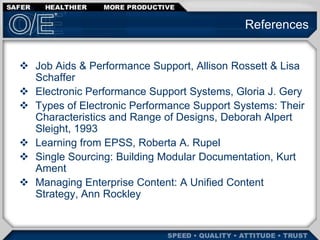Electronic Performance Support in 99 Seconds
- 1. FINGERTIP ELECTRONIC PERFORMANCE SUPPORT SYSTEMS in 99-seconds or less âŠ
- 2. Five Moments of Need ï¶ When Learning for the First Time Acquisition of ï¶ When Wanting to Learn More Knowledge Formal Instruction ï¶ When Trying to Remember and/or Apply Application & ï¶ When Things Change Maintenance of Knowledge ï¶ When Something Goes Wrong Performance Support Dr. Conrad Gottfredson, BYU Bob Mosher
- 3. Addressing the Moment of Need TRAINING SUPPORT Content- Application based of (One size Knowledge fits all) âDoâ Context/ Acquisition of Role-based Knowledge âLearnâ
- 4. How Do You Know Itâs Performance Support? A helper in life and work Repository for information, processes, and perspectives Inform and guide Planning and action
- 5. Information Overload What percentage of job knowledge do you store in your mind? 1986 1997 2006 75% 15-20% 8-10% Robert Kelley, Carnegie-Mellon University 20 Year Longitudinal Study of Knowledge Workers ï¶ It is often useful not to know things because they are going to be out-of-date or incorrect in a short time. ï¶ It is usually a better strategy not to learn them â and simply search and find the correct information when you need it Charles Jennings, Reuters
- 6. Retention and Performance Challenge The Performance Journey P 100% IMPACT of PERFORMANCE E R T E SUPPORT R 80% R T F A PERFORMANCE E O 60% I N R N T M 40% I CURRENT PERFORMANCE CHALLENGE I A N O N 20% G N C RECALL & APPLICATION E 0% 30 48 TIME 3 weeks Min. Hrs. Research Institute of America
- 7. Performance Support vs. Instruction YOU & YOUR WORK Performance Support KEEPS YOU AT WORK, MAKING YOU MORE PRODUCTIVE YOU AWAY FROM YOUR WORK Instruction
- 8. Find Information When You Need It IF you could remember EVERYTHING ⊠⊠you wouldnât need PERFORMANCE support.
- 9. References ï¶ Job Aids & Performance Support, Allison Rossett & Lisa Schaffer ï¶ Electronic Performance Support Systems, Gloria J. Gery ï¶ Types of Electronic Performance Support Systems: Their Characteristics and Range of Designs, Deborah Alpert Sleight, 1993 ï¶ Learning from EPSS, Roberta A. Rupel ï¶ Single Sourcing: Building Modular Documentation, Kurt Ament ï¶ Managing Enterprise Content: A Unified Content Strategy, Ann Rockley
- 10. Thank You Kelly Condron Learning Solutions Architect O/E Learning, Inc. kcondron@oe.com 1-248-816-5884 1-800-833-8204 ext. 5884
Editor's Notes
- So, how do we address the moments of need? Training starts broad and gets narrow. Support starts narrow--with the process or a task--and provides the exact steps that you need to complete that one task, right now. Â
- So, we send people to training to give them information, knowledge and skills, but they donât always remember what they learned. However, when training is combined with performance support, retention and recall become a nonissue and performance soars.

